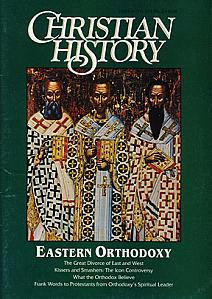Ephraem The Syrian Wrote Hymns And Is Honored for His Thought

Ephraem's output was extraordinary.
THE CATHOLIC CHURCH has honored only one Syrian father as a doctor of the church. That was Ephraem the Syrian, a fourth century ascetic, teacher, and theologian.
Ephraem was born around AD 306 at Nisibis in Mesopotamia. He then became a Christian teacher. When Persia, a nation notorious for persecuting Christians, forced the Roman Empire to relinquish Nisibis, Ephraem and many other Christians migrated to Edessa.
Ephraem was bald, short, and beardless (despite today’s image). A true ascetic, he denied himself all comforts. He wore a dirty, patched robe, lived in a cave, and ate only barley bread and vegetables.
The Syrians nicknamed him “the Harp of the Holy Ghost” because he promoted hymn singing in worship and wrote many of his own. Ephraem saw hymns as a way to convey Christian doctrine among people who could not read. Therefore, he wrote many songs about faith . He believed good hymns could counter the influence of heresy.
Ephraem became the foremost representative of a school of Bible interpretation that fell about half way between the literalism practiced in Antioch and the allegorical typology so popular in Alexandria.* He produced commentaries on virtually every book of the Bible. His writings were publicly read in some churches after the reading of the Scriptures. Georgians, Slavs, Copts, Arabs, Greeks, and Latins all translated his works into their languages.
Centuries before the doctrine of the Immaculate Conception became official dogma in Catholicism, Ephraem taught it. He also taught the real presence of Christ in the bread and wine, the primacy of Peter among bishops, the existence of purgatory, intercession of the saints, original sin, and more.
Pope Benedict XIV dedicated a hall to Ephraem, saying he “was the most important representative of Syriac Christianity, and succeeded in a unique way to reconcile the vocation of the theologian with that of the poet.” Typical of such a reconciliation was Ephraem’s beautiful tribute to Christ: “He alone suffices for all, yet none for him suffices. Altar he is and lamb, victim and sacrificer, priest as well as food.”
Despite his hermit-like existence, Ephraem was active in the affairs of Edessa. His last public act was to distribute grain during a famine because no one else was trusted to do the job impartially. Ephraem is thought to have died on this day, 18 June 373.
—Dan Graves
* For an explanation of the allegorical approach, see our article The Bible's Story Is Our Story on Origen in Christian History 105 Christianity in Early Africa.
----- ------ ------
For an an in-depth look at the history and distinctive beliefs of the Orthodox Church watch The History of Orthodox Christianity at RedeemTV
The History of Orthodox Christianity can be purchased at Christian History Institute
For more on Eastern Christianity read Christian History #54 Eastern Orthodoxy, then and now






